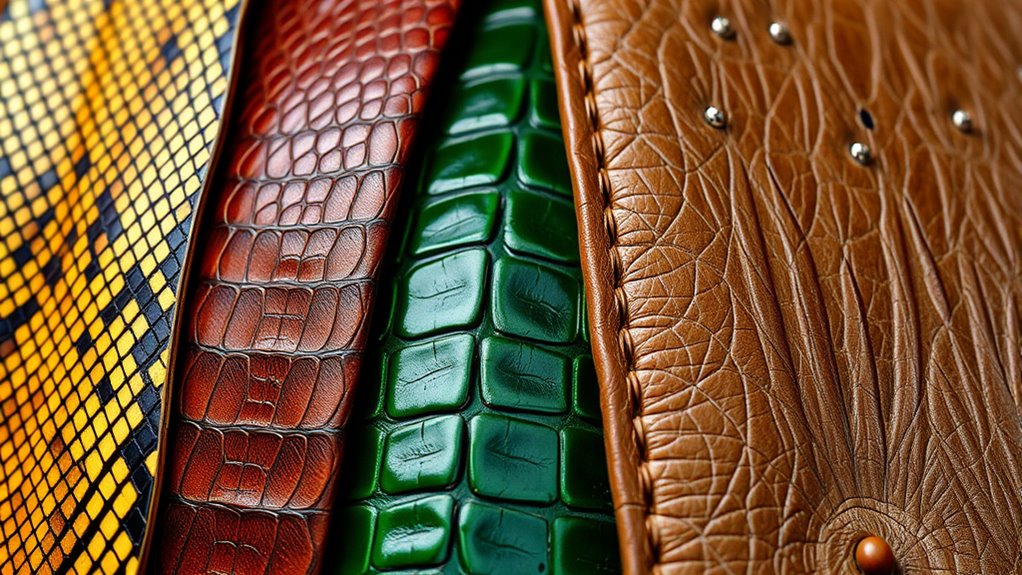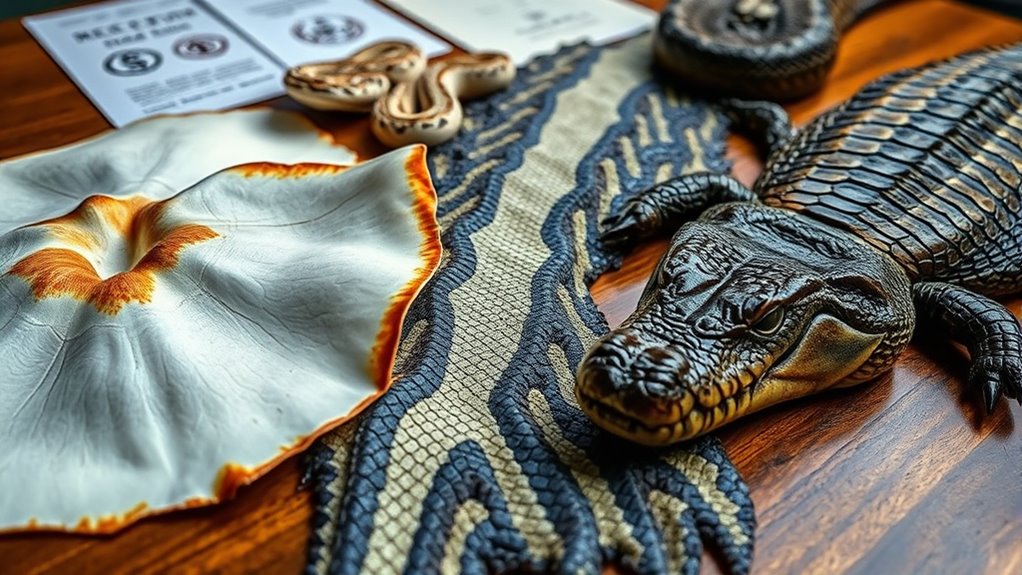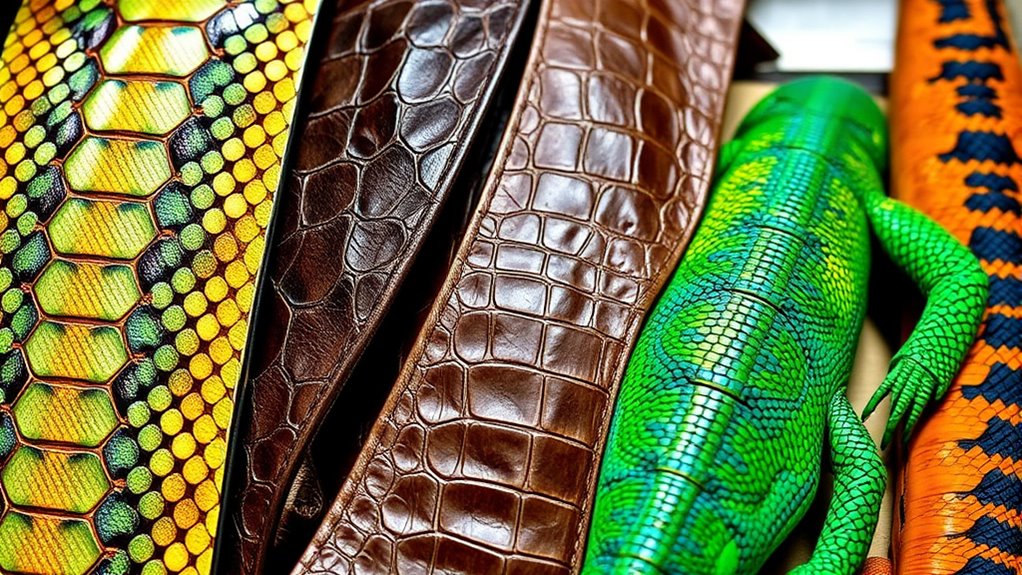Exotic skins come from rare animals and are prized in luxury fashion for their unique patterns and textures. However, their trade is tightly regulated by international laws like CITES to prevent illegal poaching and protect wildlife. Ethical sourcing promotes sustainability, animal welfare, and conservation efforts. To make responsible choices, you should learn about legal sourcing and certifications. Keep exploring to understand how supporting lawful and sustainable practices can help preserve these incredible species.
Key Takeaways
- Exotic skins are rare animal hides valued for their unique appearance and cultural significance, often representing wealth and tradition.
- Legal regulations, such as CITES permits, are in place to prevent illegal poaching and ensure sustainable sourcing.
- Ethical considerations focus on animal welfare, conservation, and supporting responsible, environmentally friendly harvesting practices.
- International treaties and enforcement agencies work together to combat illegal wildlife trafficking and protect endangered species.
- Responsible ownership involves researching suppliers, choosing certified products, and avoiding items linked to habitat destruction or poaching.
What Are Exotic Skins and Why Are They Valued?

Exotic skins refer to the hides of rare or unusual animals used in luxury fashion and accessories. These materials hold deep cultural significance in many societies, symbolizing status, tradition, and craftsmanship. Their uniqueness and rarity make them highly sought after by collectors who value exclusivity and artistry. The allure of exotic skins lies in their distinctive patterns, textures, and colors, which can’t be replicated with common leathers. For many, owning items made from such skins represents a connection to cultural heritage or a statement of wealth. Collector interest drives demand, often elevating the value of these items over time. This combination of cultural meaning and rarity helps explain why exotic skins remain so prized in luxury markets worldwide.
Legal Regulations Governing Exotic Skin Trade

The trade in exotic skins is heavily regulated by international laws and national policies designed to prevent illegal poaching and protect endangered species. You must be aware that wildlife trafficking is a major concern, leading governments to implement strict controls over the import, export, and sale of exotic skins. These regulations aim to promote sustainable practices, ensuring that harvesting methods don’t threaten species survival. Many countries require permits such as CITES certificates to verify legal sourcing. Violating these laws can result in hefty fines, confiscation, or criminal charges. As a consumer or seller, it’s your responsibility to comply with these regulations and support lawful trade. Doing so helps combat wildlife trafficking and encourages the adoption of sustainable practices in the exotic skin industry.
Ethical Considerations and Animal Conservation

While legal regulations help control the exotic skin trade, ethical considerations and conservation efforts are equally essential in ensuring that this industry doesn’t harm animal populations or ecosystems. Prioritizing wildlife preservation means supporting sustainable practices that prevent overexploitation and habitat destruction. You should also consider animal welfare, ensuring that sourcing methods minimize suffering and respect natural behaviors. Exploiting animals for exotic skins can threaten species with extinction and disrupt delicate ecosystems. By choosing products from responsible sources, you help promote ethical standards that value the long-term health of both animals and their environments. Supporting conservation initiatives and raising awareness can foster a more sustainable industry, where the beauty of exotic skins doesn’t come at the cost of wildlife preservation or animal welfare. Educational awareness plays a crucial role in promoting responsible consumption and encouraging industry accountability. Additionally, implementing sustainable sourcing practices can significantly reduce negative impacts on vulnerable species, ensuring that the industry contributes positively to animal conservation. Incorporating regulations and compliance can further strengthen efforts to protect endangered species and promote ethical trade practices. Promoting animal welfare is also vital to ensure that legal and ethical standards are upheld throughout the supply chain.
International Treaties and Enforcement Measures

International treaties and enforcement measures play a crucial role in regulating the trade of exotic skins across borders. These agreements, like CITES, guarantee enforcement agencies can monitor and prevent illegal wildlife trafficking. When countries adhere to treaty compliance, they help protect endangered species and uphold legal standards. You can imagine:
| Enforcement Agencies | Cross-border Cooperation |
|---|---|
| Customs Officials | International Patrols |
| Wildlife Inspectors | Shared Databases |
| Border Patrols | Joint Task Forces |
| CITES Authorities | Penalties and Sanctions |
This structure strengthens enforcement, making it harder for illegal traders to operate unnoticed. Effective enforcement is essential to combat illegal trade and support conservation efforts. Moreover, international cooperation ensures that efforts are synchronized globally, reducing loopholes that traffickers might exploit. The integration of law enforcement networks across countries further enhances the ability to track and apprehend illegal traders effectively. Strengthening border security measures is also vital in this ongoing effort.
Making Informed Choices: Responsible Sourcing and Ownership

How can you guarantee that your ownership of exotic skins aligns with ethical and sustainable practices? Start by researching the sources of your skins and choosing suppliers committed to wildlife conservation. Look for certifications or transparency reports that confirm sustainable practices and legal harvesting methods. Prioritize vendors who support wildlife conservation efforts and avoid products linked to illegal poaching or habitat destruction. Making informed choices also means understanding the impact on ecosystems and animal populations. wildlife conservation plays a crucial role in maintaining biodiversity and ecological balance. By supporting responsible sourcing, you help promote sustainable practices that protect endangered species and preserve biodiversity. Ensuring legal harvesting methods are used is essential to uphold ethical standards in the industry. Your purchasing decisions directly influence industry standards and conservation efforts. Staying educated and choosing ethically sourced exotic skins ensures your ownership aligns with ethical values and contributes positively to wildlife conservation. Additionally, understanding newborn care can help ensure your pets and children are safe while enjoying luxury items. Being aware of the environmental impact of exotic skins encourages more eco-conscious decisions and supports conservation initiatives. Incorporating knowledge about sustainable practices can further guide responsible consumption and support long-term ecological balance.
Frequently Asked Questions
How Can Consumers Verify the Authenticity of Exotic Skin Products?
To verify the authenticity of exotic skin products, you should look into authentication methods like detailed craftsmanship and unique markings. Always seek products with certification programs from reputable organizations, which verify genuine materials. Ask for documentation or certificates of authenticity, and buy from trusted sellers. Doing your research guarantees you’re making an ethical choice and avoiding counterfeit items, helping you confidently enjoy your purchase while supporting sustainable practices.
Are There Sustainable Alternatives to Real Exotic Skins?
Think of sustainable options as a gust of fresh air in a smoky room. You can choose farmed alternatives, which are ethically sourced and environmentally friendly. Synthetic options, like high-quality faux leather, mimic exotic skins without harming animals. These alternatives are gaining popularity because they offer style and durability while reducing ecological impact. So, yes, you can enjoy luxurious designs without compromising your values or the planet’s health.
What Are the Economic Impacts of Exotic Skin Trade on Local Communities?
You might not realize it, but the exotic skin trade considerably impacts local communities by fueling wildlife conservation efforts and promoting economic development. When you support sustainable practices, you help protect endangered species and create jobs for local people. This trade can boost local economies through tourism and craft industries, ensuring communities thrive while maintaining biodiversity. Your choices can directly influence the balance between wildlife conservation and economic growth in these regions.
How Do Illegal Exotic Skin Markets Operate and Evade Regulation?
You should know that illegal exotic skin markets operate through complex black market operations designed to evade regulation. They often involve smuggling, bribery, and falsified documents to bypass authorities. These traders intentionally hide their activities and use covert channels to avoid detection. By doing so, they successfully evade regulation, making it difficult for law enforcement to track and shut down these illicit networks, which perpetuates their illegal trade.
Can Exotic Skins Be Ethically Sourced Without Harming Animals?
Is it possible to turn the page and source exotic skins ethically? You can, if you prioritize ethical farming practices and support conservation efforts. By choosing suppliers committed to sustainable methods, you help reduce harm and promote animal welfare. These efforts ensure that exotic skins are obtained responsibly, respecting wildlife and ecosystems. In this way, ethical sourcing converts what once seemed a grey area into a conscious choice for fashion lovers.
Conclusion
Now that you know the nuances of exotic skins, you can confidently choose conscientiously. By understanding the legal limits, ethical implications, and environmental effects, you’re empowered to make mindful, meaningful decisions. Remember, responsible sourcing supports sustainable species survival and stops shady, illegal schemes. So, stay savvy, scrutinize sources, and safeguard species—because ethical choices guarantee exotic skins remain exotic, not extinct, for generations to come.









